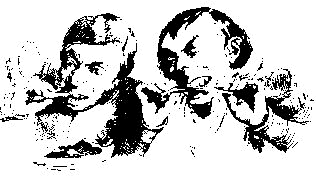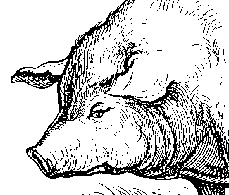Curmudgeon's Cookery - English Anecdotes
![]()
 From
Directions To Servants.
Satire by Jonathan Swift 1745
From
Directions To Servants.
Satire by Jonathan Swift 1745
"If you are bringing up a Joint of meat in a Dish, and it falls out of your
Hand, before you get into the Dining Room, with the Meat on the Ground, and the
Sauce spilled, take up the Meat gently, wipe it with the Lap of your Coat, then
put it again into the Dish, and serve it up; and when your Lady misses the
Sauce, tell her, it is to be sent up in a Plate by itself. When you carry up a
Dish of meat, dip your fingers in the Sauce, or lick it with your Tongue, to try
whether it be good, and fit for your Master's Table..."
(to the cook) "...you are not to wash your Hands till you
have gone to the Necessary-house, and spitted your Meat, trussed your Pullets,
pickt your Sallad, nor indeed till after you have sent up the second Course; for
your Hands will be ten times fouled with the many Things you are forced to
handle; but when your Work is over, one Washing will serve for all..."
Dickens' Lickens. Charles Dickens (1812-1870) skillfully describes
cookery in the collection of essays Uncommercial Traveller of 1860)
Chapter VI, Refreshments for Travellers, comments on wretched food and
indifferent, frustrating waiters in England: "..I turn my disconsolate eyes
on the refreshments that are to restore me. I find that I must either scald my
throat by insanely ladling into it, against time and for no wager, brown hot
water stiffened with flour; or I must make myself flaky and sick with Banbury
cake; or, I must stuff into my delicate organisation, a currant pincushion which
I know will swell into immeasurable dimensions when it has got there; or, I must
extort from an iron-bound quarry, with a fork, as if I were farming an
inhospitable soil, some glutinous lumps of gristle and grease, called pork-pie…
From a beetle-haunted kitchen below this institution, fumes arose, suggestive of
a class of soup which Mr. Grazinglands knew, from painful experience, enfeebles
the mind, distends the stomach, forces itself into the complexion, and tries to
ooze out at the eyes."
(Waiter Attitude) "..he is cold to you. He is not glad to see you,
he does not want you, he would much rather you hadn't come…You order the bill,
but your waiter cannot bring your bill yet, because he is bringing, instead,
three flinty-hearted potatoes and two grim head of broccoli…you imperatively
demand your bill; but, it takes time to get, even when gone for, because your
waiter has to communicate with a lady who lives behind a sash-window in a
corner, and who appears to have to refer to several Ledgers before she can make
it out…and [the waiter] lets you out into the street with the air of one saying to
himself, as you cannot again doubt he is, 'I hope we shall never see YOU here
again!' "
 Such is Life: All Flesh is Pork. Dickens' American Notes has
droll humor on American and Canadian life-styles and culture, including cookery
and table manners. His description of an old pig roaming the streets of New
York City is fabulous: "He is a free-and easy, careless, indifferent kind
of pig, having a very large acquaintance among other pigs of the same character,
whom he rather knows by sight than conversation, as he seldom troubles himself
to stop and exchange civilities…He is a great philosopher, and seldom moved…Sometimes
indeed, you may see his small eye twinkling on a slaughtered friend, whose
carcase garnishes a butcher's door-post, but he grunts out 'Such is life:
all flesh is pork!' buries his nose in the mire again, and waddles down the
gutter: comforting himself with the reflection that there is one snout the less
to anticipate stray cabbage-stalks, at any rate."
Such is Life: All Flesh is Pork. Dickens' American Notes has
droll humor on American and Canadian life-styles and culture, including cookery
and table manners. His description of an old pig roaming the streets of New
York City is fabulous: "He is a free-and easy, careless, indifferent kind
of pig, having a very large acquaintance among other pigs of the same character,
whom he rather knows by sight than conversation, as he seldom troubles himself
to stop and exchange civilities…He is a great philosopher, and seldom moved…Sometimes
indeed, you may see his small eye twinkling on a slaughtered friend, whose
carcase garnishes a butcher's door-post, but he grunts out 'Such is life:
all flesh is pork!' buries his nose in the mire again, and waddles down the
gutter: comforting himself with the reflection that there is one snout the less
to anticipate stray cabbage-stalks, at any rate."
Precious Mixture.
Tobias G. Smollett, MD, in his novel Humphry Clinker has
this gross account of early London milk handling:
"...milk...the produce of faded cabbage-leaves and sour draff, lowered with
hot water, frothed with bruised snails, carried through the streets in open
pails, exposed to foul rinsings, discharged from doors and windows, spittle,
snot, and tobacco-quids from foot-passengers, over-flowing from mud-carts, splatterings
from coach-wheels, dirt and trash chucked into it by roguish boys for the
joke's-sake, the spewings of infants, who have slabbered in the tin-measure,
which is thrown back in that condition among the milk, for the benefit of the
next customer; and, finally, the vermin that drops from the rags of the nasty
drab that vends this precious mixture, under the respectable denomination of
milk-maid."
Chanticleer and Carnation Milk. Thomas Overbury in 1615 expressed a kinder view in the essay A Fair and Happy Milkmaid: ". . . is a country wench . . . She doth not, with lying long abed, spoil both her complexion and conditions; nature hath taught her, too immoderate sleep is rust to the soul: she rises therefore with chanticleer. . . In milking a cow, and straining the teats through her fingers, it seems that so sweet a milk-press makes the milk the whiter or sweeter."
After Curmudgeon finished college, he escaped Southern Illinois and his father's 60 Holstein cows by getting a job in California. This light verse has a special place in Cumudgeon's my heart:
The Virtues of Carnation Milk
Carnation milk is the best in the land;
Here I sit with a can in my hand--
No tits to pull, no hay to pitch,
You just punch a hole in the son of a bitch.
(Anonymous)
A Dissertation Upon Roast Pig. English Essayist Charles Lamb
(1775-1834) has this humorous story on the origin of roast pig, part of the
collection Essays of Elia:
"Mankind, says a Chinese manuscript, which my friend M. was obliging enough
to read and explain to me, for the first seventy thousand ages ate their meat
raw, clawing or biting it from the living animal…"
Then, cooked meat was discovered:
"Bo-bo, a great lubberly boy, who being fond of playing with fire, as
younkers of his age commonly are, let some sparks escape into a bundle of straw,
which kindling quickly, spread the conflagration over every part of their poor
mansion [housing a litter of 9 pigs] , till it was reduced to ashes…an odour
assailed his nostrils…He knew not what to think. He next stooped down to feel
the pig, if there were any signs of life in it. He burnt his fingers, and to
cool them he applied them in his booby fashion to his mouth. Some of the crumbs
of the scorched skin had come away with his fingers, and for the first time in
his life (in the world's life indeed, for before him no man had known it) he
tasted--crackling!…The truth at length broke into his slow
understanding, that it was the pig that smelt so, and the pig that tasted so
delicious; and surrendering himself up to the new-born pleasure, he fell to
tearing up whole handfuls of the scorched skin with the flesh next it, and was
cramming it down his throat in his beastly fashion…"
Grace Before Meat. This has to be one of the more engaging of Charles
Lamb's essays:
"The custom of saying grace at meals had, probably, its origin in the early
times of the world, and the hunter-state of man, when dinners were precarious
things, and a full meal was something more than a common blessing…the
benediction before eating has its beauty at a poor man's table, or at the simple
and unprovocative repast of children. It is here that the grace becomes
exceeding graceful. The indigent man, who hardly knows whether he shall have a meal the next day or
not, sits down to his fare with a present sense of the blessing, which can be
but feebly acted by the rich, into whose minds the conception of wanting a
dinner could never, but by some extreme theory, have entered. The proper end of
food--the animal sustenance--is barely contemplated by them. The poor man's
bread is his daily bread, literally his bread for the day…"
Loathsome Slime and Bitter Bread. Oscar Wilde (1854-1900) wrote the very haunting The Ballad of Reading Gaol. A part this touching poem is shared:
For they starve the little frightened child
Till it weeps both night and day:
And they scourge the weak, and flog the fool,
And gibe the old and grey,
And some grow mad, and all grow bad,
And none a word may say.
Each narrow cell in which we dwell
Is a foul and dark latrine,
And the fetid breath of living Death
Chokes up each grated screen,
And all, but Lust, is turned to dust
In Humanity's machine.
The brackish water that we drink
Creeps with a loathsome slime,
And the bitter bread they weigh in scales
Is full of chalk and lime,
And sleep will not lie down, but walks
Wild-eyed, and cries to Time.
Oscar Wild described the wretched treatment of children in prison based upon personal observation. In addition to being confined alone 23 hours a day in a dark, dirty cell, children were often hungry from an unpalatable, diarrhea-producing diet ". . . a piece of usually badly-baked prison bread and a tin of water for breakfast at half-past seven. At twelve o'clock it gets dinner, composed of a coarse Indian meal stirabout; and at half--past five it gets a piece of dry bread and a tin of water for its supper. . . A child who has been crying all day long, and perhaps half the night, in a dimly lit cell, and is preyed upon by terror, simply cannot eat food of this coarse, horrible kind." Letter to the Daily Chronicle editor.
Kermit McKemie mailto:kmckemie@astound.net
![]()